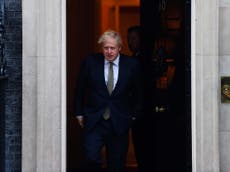This is how to solve the issue of freedom of movement in a post-Brexit Britain
Boris Johnson has to craft a policy that means the UK has access to the single market of trade in goods and services

The EU Commission president, Ursula von der Leyen, could not have been clearer. Launching the six-month EU rotating presidency which will deal with Brexit negotiations she declared: “If there is no freedom of movement of people of course there can be no free movement of goods and services and capital.” Michel Barnier said the same on French radio on Sunday.
Freedom of movement has been the most intractable of all the issues that contributed to Brexit.
It was the 1950 European Coal and Steel Community Treaty that wrote into the first European rule-book the concept of non-discrimination in hiring workers on grounds of religion or nationality. Gradually, this was transformed into one of the so-called freedoms of movement – of capital goods, services, and people – at the heart of the single market.
All countries have benefited. Britain sent the Auf Wiedersehen Pet unemployed steel and shipyard workers of the 1980s to full employment in Germany. Meanwhile workers from Poland, to name but one nation, have contributed significantly in paying taxes and national insurance in the UK.
But as Dominic Cummings freely admits, the constant drumming on the theme of uncontrolled immigration helped win the 2016 referendum and now the government feels obliged to bring in new rules to sate the anti-immigrant passions unleashed this century by anti-EU campaigners.
It would be useful to separate rules for immigrants coming from far away and seeking permanent settlement, rather like those who make up 29 per cent of the Australian population who enter via its point system.
For workers from Europe it would make sense to manage arrivals via controls on the internal labour market rather than a clunky, expensive Home Office immigration bureaucracy that even with good intentions will produce harsh and Windrush-type decisions that are unavoidable.
The UK could start by actually knowing which EU citizens are working here. Currently the government has no such statistics. The registration system that was set up in 2004 but abolished by Theresa May in 2011 would be a beginning, in my view. A card such as issued in the Netherlands and Ireland for any access to public services would reassure voters that only legally resident EU citizens were getting free NHS care.
The biggest employer of EU citizens is the NHS. Boris Johnson could do worse than to announce new medical and nursing schools in the northern and midland constituencies he has just conquered, to train more people for healthcare work.
Assuming the UK will not impose tourist visas on EU citizens, there is potential for those who wish to abuse the system to disappear into the unregulated cash-in-hand labour market. EU rules stipulate that anyone without a job can be sent home after three months. This needs to be enforced.
There is a chronic shortage of skilled craftsworkers which also drags on productivity. A vocational training revolution based on best practice in Switzerland, Germany, the Netherlands or Nordic countries would be welcomed by all families who voted Tory for the first time last December and want to see their children equipped with skills for jobs
Such a change in internal labour market management would go against the grain of the ultra-liberal, de-regulated, low-pay UK labour market espoused as much by Tony Blair and Gordon Brown as by Margaret Thatcher and David Cameron.
But with skilful design it could: firstly, satisfy voters’ desire for getting back control of the labour market to support British citizens; secondly, allow enough freedom of movement from Europe to permit UK access to the single market of trade in goods and services; and finally, put some flesh on Johnson’s proclaimed updating of One Nation Conservatism.
Denis MacShane is the UK’s former minister of Europe and the author of ‘Brexiternity. The Uncertain Fate of Britain’



Join our commenting forum
Join thought-provoking conversations, follow other Independent readers and see their replies